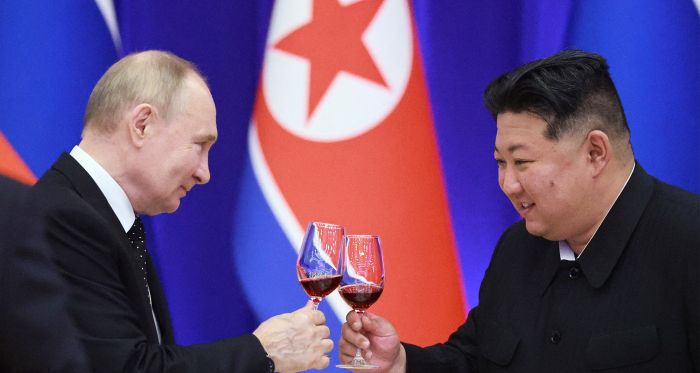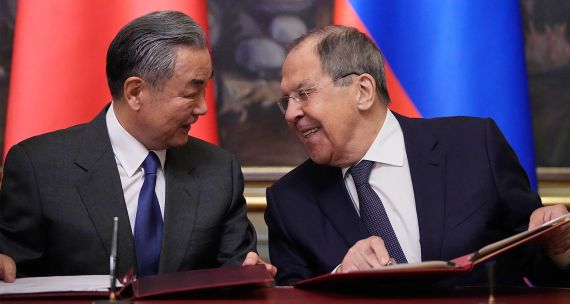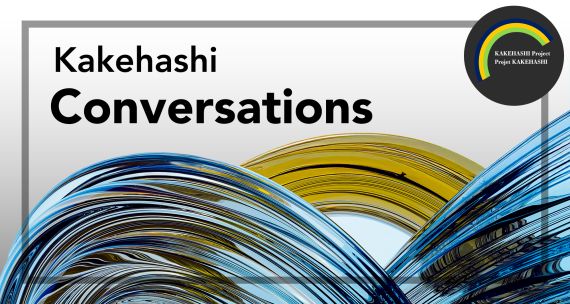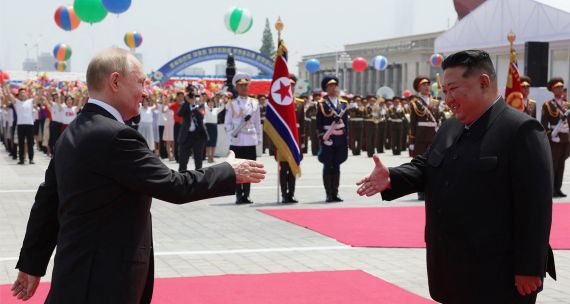The Takeaway
A new and enhanced security partnership between Russia and North Korea marks a watershed moment in contemporary great power competition, effectively merging the Indo-Pacific and European security theatres and helping to solidify Japan and South Korea’s alignment – both with each other and with the U.S. and its other allies.
Canada has an opportunity to demonstrate its value as a partner in both geopolitical spheres – through its membership in NATO (and its support for Ukraine in its war against Russia), and by leveraging its Indo-Pacific Strategy and commitment to strengthen security co-operation with Tokyo and Seoul.
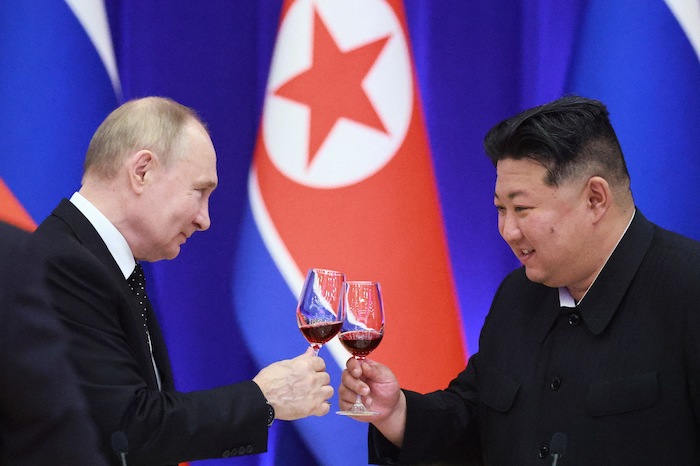
In Brief
- On June 17-18, Russian President Vladimir Putin made a rare visit to North Korea, which culminated in the two Cold War allies elevating their relationship to a “comprehensive strategic partnership” – the highest level of Moscow’s diplomatic commitment. Compared to their Soviet-era relationship, North Korean leader Kim Jong Un is now playing a stronger hand; in prosecuting his war in Ukraine, Putin desperately needs military hardware, which the heavily militarized North Korea can easily provide.
- It’s not yet clear, however, how North Korea will benefit from the upgraded partnership. It already has considerable indigenous capacity to develop nuclear weapons and weapons-delivery systems, but Moscow could help it leapfrog the next stages of development by transferring sensitive military technology.
- In the immediate aftermath of the Kim-Putin meeting, the South Korean government said it was contemplating revising its previous commitment to provide only non-lethal assistance to Ukraine. It later qualified that statement by saying that any decision to send lethal aid to Kyiv would be contingent upon Russia’s actions vis-à-vis North Korea.
- Canada also has a direct stake in security on the Korean Peninsula: it has maintained a continuous presence in the United Nations Command in South Korea since the start of the Korean War in 1950. It is also actively supporting, through Operation NEON, a multinational effort to enforce UN sanctions aimed at pressuring Pyongyang to abandon its weapons of mass destruction programs. Russia is now working actively to dismantle UN sanctions (which it has once voted for), which could inject greater uncertainty and urgency into these enforcement actions.
Implications
A “galvanizing” effect on Japan-South Korea-U.S. security co-operation.
Since the leaders of Japan, South Korea, and the U.S. held a historic summit at Camp David in August 2023, the three allies have worked assiduously to institutionalize their economic and security co-operation, especially the Seoul-Tokyo leg of that relationship. The new sense of urgency after the Kim-Putin meeting is likely to “turbocharge” this co-operation. On June 23, Washington, Seoul, and Tokyo issued a joint statement condemning “in the strongest possible terms” the deepening military co-operation between Russia and North Korea. Notably, the joint statement also reflected the broadening of the security horizons of Tokyo and Seoul; part of the condemnation was that North Korean weapons transfers to Russia would “prolong the suffering of the Ukrainian people.”
In 2022, Japan and South Korea became NATO observers, prompted by the growing concern they shared with NATO members about Russian aggression and China’s growing international assertiveness.
Beijing remains mostly on mute.
North Korea is China’s only formal ally and Russia is China’s closest strategic partner. As such, even though China has some misgivings about deepening Russia-North Korea co-operation, it has been reticent to criticize its two partners publicly. However, China is concerned that Kim, suddenly feeling he has more leverage vis-à-vis Beijing, could be emboldened to take actions that would destabilize the region – something that is clearly not in China’s interests.
In addition, Beijing has been consistent in deriding the U.S. and its allies for forming “small blocs” and Cold War-style alliances “that divide the world into rival camps.” It would not want to be seen as undermining its stance by joining a “small bloc” of its own. China has therefore been careful to describe relations among Beijing, Pyongyang, and Moscow as three discrete bilateral relationships rather than as an emerging trilateral arrangement.
Finally, Beijing would not want to be hemmed in by Moscow and Pyongyang. Rather, it wants to preserve some manoeuvrability to improve relations with Seoul and even Tokyo, in hopes of drawing them away from the U.S.’s orbit. In fact, while Putin was in North Korea, Chinese diplomatic and military personnel were meeting with their South Korean counterparts to talk about issues such as stability on the Korean Peninsula.
Japan gets a “moment of clarity.”
Japan has been unambiguous in viewing the enhanced Russia-North Korea partnership as a further deterioration of its security environment. In the past, Tokyo tried to resolve sensitive bilateral issues with both countries, namely, the settlement of the Northern Territories issue with Russia and the abduction of Japanese citizens by North Korea. According to one expert, recent developments all but close the door on any hope of making progress on either issue, thereby giving the Japanese leaders “clarity” on the need to double down on Japan’s alliance with the U.S.
What’s Next
Indo-Pacific security will be on the agenda at the upcoming NATO summit
On July 9-11, Washington will host the 2024 NATO Summit, which could provide more visibility on how the Indo-Pacific (especially northeast Asia) and European security theatres are melding together. In view of the deteriorating security environment in both the Indo-Pacific and Europe, the pressure on Canada will continue to increase to meet its collective security obligations, including the two per cent NATO threshold.
